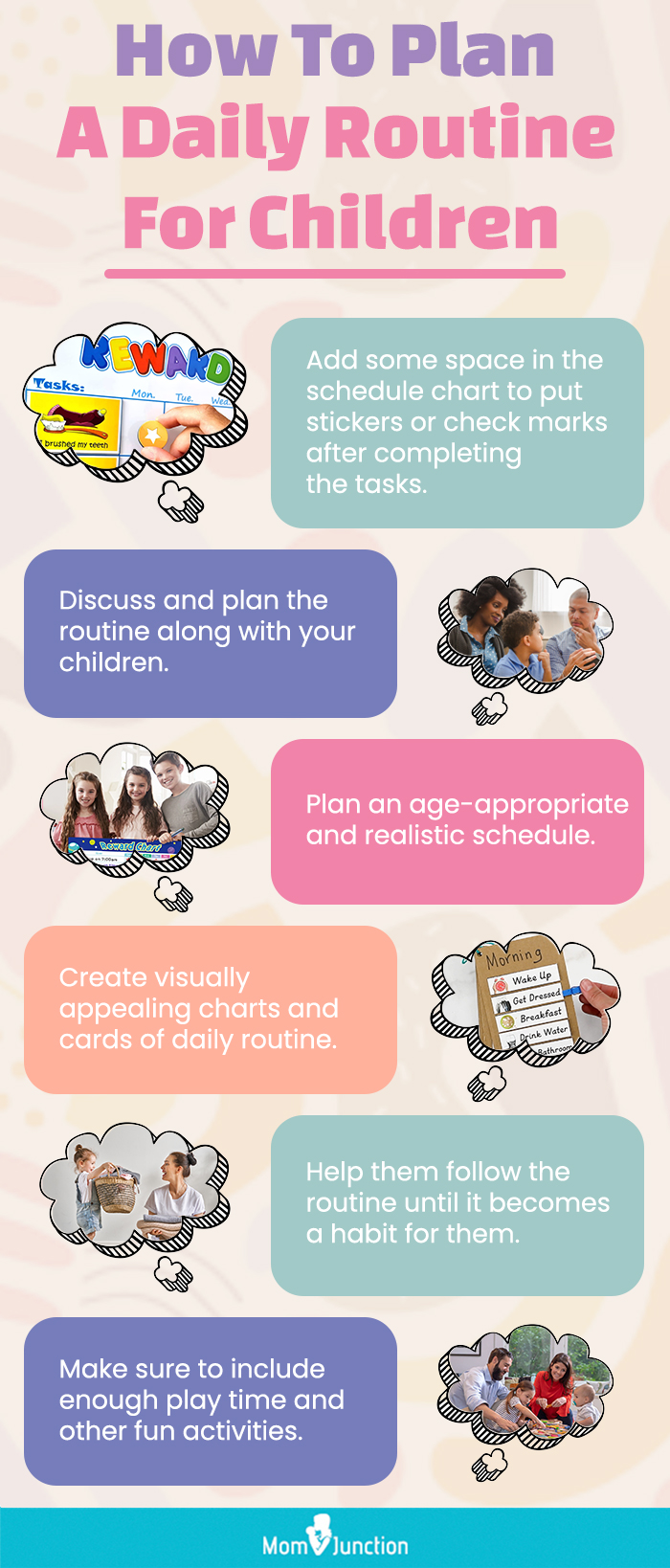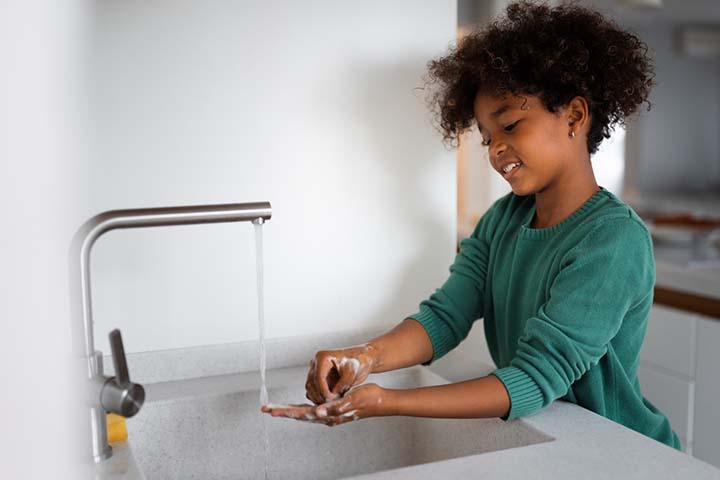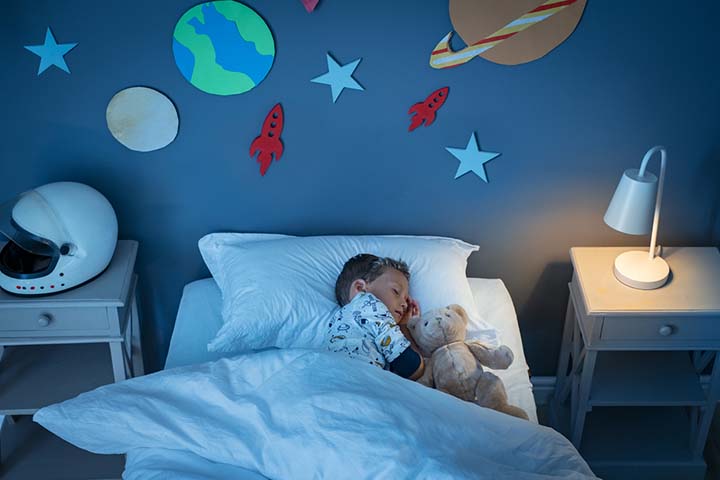
Image: Shutterstock
How do you set a daily routine for kids? The best schedule should be such that it works for them and you.It should help your children be productive, disciplined and help them build some important decision-making skills.Also, it should make them inculcate good habits and invite peace to their minds and home. In this post, we bring you some benefits of a healthy routine for children, along with some tips to help you set it wisely.
Importance Of Routine For Children
为孩子建立一个日常工作平台ht from when they wake up to going back to sleep, is crucial as it teaches them to manage time and gives them the confidence to perform daily tasks independently. Besides, it also brings uniformity to your daily life.
 Did you know?
Did you know?Read on as we tell you why you should encourage your child to set a daily routine.
1. Helps children imbibe healthy habits
Image: IStock
Establishing a set daily routine helps your children imbibehealthy habitssuch as washing hands, brushing teeth, combing hair, doing homework, cleaning the room, and getting dressed.Developing a habit takes practice and repetition, and often, you have to beg them to do their tasks.Thus, setting a routine encourages and guides them to complete these chores or imbibe certain habits that will stay with them until adulthood.
2. Reduces parental exhaustion
When a family establishes a routine, life runs more smoothly, and the family gets more time to bond.Setting up a routine at home can help all members become more organized and lower your stress levels. It also allows children and parents to find free time to play, relax, or be creative.
Having fun orspending timetogether such as during lunch and dinner time promotes a sense of belonging and improves family relationships. A consistent routine will also help your child become more independent once they have developed a habit of following it with less supervision or help from their parents or elders.
3. Helps manage screen time
Image: IStock1
Using less social media and reducing screen time can give children more time to engage in outdoor games and get some physical activity. You can also try to encourage them to read books.
It is essential to manage the time that children spend onsocial mediaplatforms.Allot a set time for your child to spend on their phone as a part of their routine. For instance, you could allow them to do this after they complete a piece of schoolwork. This will teach your child the importance of taking the time away from their screens and value the time they have.
 Point to consider
Point to consider4. Makes children responsible
A set routine accustoms your children to know what they need to do. Whether it is a chore such as helping you with cooking or an activity, they would know their responsibilities, and they do not have to be reminded repeatedly. This also helps you instill a sense of independence in children.
5. Makes a child’s bedtime easy
Image: IStock
It’s not easy to get your children to go to bed. Daily schedules and bedtime rituals such as storytelling play a huge role in helping them get good sleep and function at their best. Sleepiness can affect your child’s ability to pay attention and perform day-to-day activities. A routine also helps set your child’s body clock, allowing your child’s body to know when it is time for bed.
Tips To Set A Daily Routine For Your Child
You could start establishing a routine from when your child is still a toddler. Here are a few tips for setting a daily routine for your child.
1. Involve your child in decision-making. Discuss with them and plan out a routine that works for you and them.
Image: IStock
2. Some children may not like the idea of following a schedule. If your child is one of them, involve them in some funlearning activitiesduring playtime. You may take them with you for gardening or swimming. These will enable them to learn important skills while having fun. You could also make handmade or printed routine charts that appeal to them.
3. Ensure the routine is realistic and fits your child’s age. Explain the routine to your child and ensure they understand what you want them to do and when. Also, assist them in their routine until they build a habit of doing it on their own.
4. Create visual routine charts or cards that will help remind your child of what to do. Place them at appropriate places or in every room so that they are noticeable to everyone at home.Encourage themto refer to the chart after each activity.
5. If your child is unable to complete a specific task within the schedule, break the process into smaller steps.
6. Have a method to indicate when each step has been completed by using a checkmark, sticker, etc.
7. Provide positive feedback or offer praise whenever they complete a task or showgood behavior.
Image: IStock
8. When you set up a schedule, ensure your child knows what to do each part of the day. For example, they should brush their teeth, take a bath, get dressed, comb their hair, eat breakfast, etc., each morning.
 Quick tip
Quick tip9. Make sure the evening routine includes making the bed, packing bags, sorting out clothes, and arranging school uniforms to save time in the morning.
10. Be flexible with the routines during the weekends or school holidays. You could let them sleep in a bit later, spend a little more time with friends, have an extra snack, etc.
Chart For Daily Routine
Frequently Asked Questions
1. What is the best morning routine?
The best morning routine for kids includes getting up early, exercising, or doing yoga for a short period, and then beginning to get ready for school. Allow or encourage your children to do their morning rituals independently from an early age, such as using the washroom, brushing their teeth, bathing, wearing their uniforms, and eating breakfast.
2. How can I improve your kids’ daily routine?
如果你的日常工作为你的孩子并不会g as planned, try to figure out what’s causing the issues and fix them. For example, if waking up early is challenging, get yourself and your children to sleep early at night; if preparing breakfast is a hassle, decide on a breakfast menu for the entire week based on your kids’ preferences. Also, set study hours and screen time, and try to be with your children during study hours. The routine may be disrupted occasionally, but this should not be a continuing problem.
3. Should infants be put on routines as early as possible?
Infants can benefit from routines since it gives them a sense of predictability, security, and consistency. While infants’ sleep and feeding schedules are erratic in the first few months, as they become older, they tend to settle into more regular patterns. Infants can develop healthy eating and sleeping habits with mild routines. But it’s crucial to remember that every child is different, and their demands could change.
Establishing a daily routine for kids enables them to stay organized, work independently, and complete their tasks on time. It also reduces your stress and provides you with more free time. Although some children dislike following a routine, you can encourage them by asking their opinion while making the routine, involving them in fun or recreation activities, and using visually attractive routine charts. Once children start following routines, they will understand their responsibilities better. Besides, you will feel less tired and get sufficient time to bond with your children and other family members.
Infographic: Quick Tips To Make A Daily Routine For Children
A good and established routine ensures a disciplined and organized way of living for children or adults. However, creating a daily routine for children is essential and can be challenging, too. Therefore, we have outlined some helpful tips in the infographic below to help you make a good and balanced daily routine for your children.

Illustration: Momjunction Design Team
Get high-quality PDF version by clicking below.
Download Infographic
Key Pointers
- A routine instills accountability and is necessary for effective time management.
- Teach children to maintain a routine with the help of an illustrative chart.
- Include all the parts of the day in the routine.
- 计划程序以及它们和灵活的with their choices.
References:
2.The Importance of Schedules and Routines;Early Childhood Learning & Knowledge Center






















